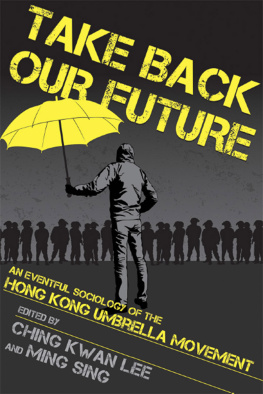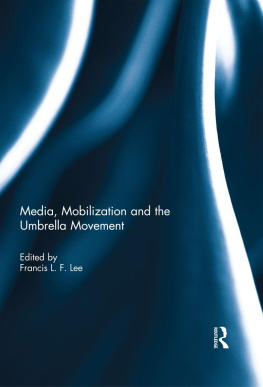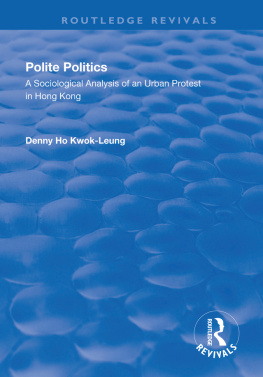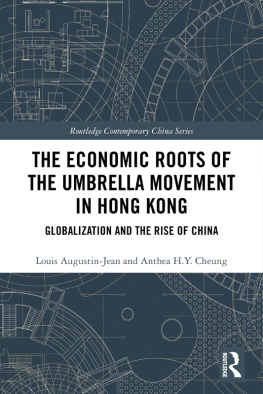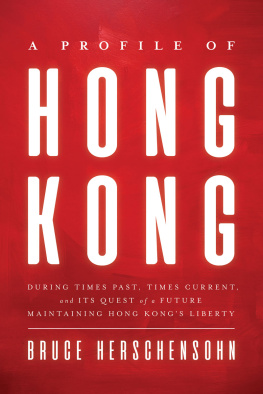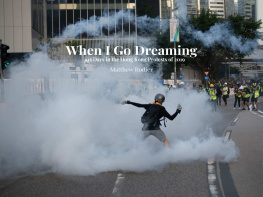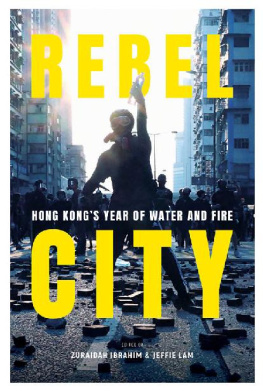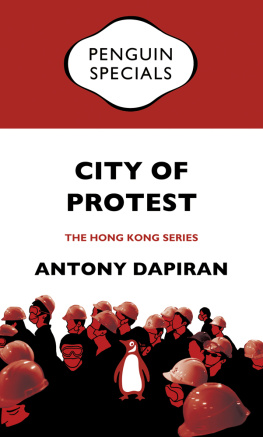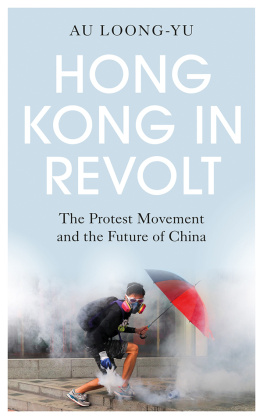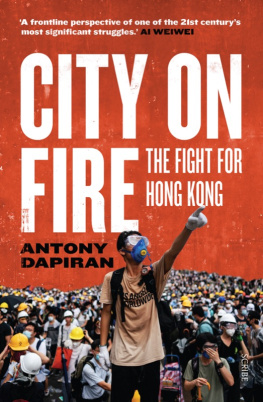Acknowledgments
We are grateful for the generous support of the Hong Kong University of Science and Technology and the University of CaliforniaLos Angeles. A faculty collaboration grant jointly run by the two universities allowed us to organize two workshops in Hong Kong where authors presented their drafts and gained valuable feedback from invited discussants. We also benefited from the insights of movement activists, documentary filmmakers, journalists, and scholars in related fields. For their input and encouragement, we thank Joshua Wong, Kin-man Chan, Evans Chan, Tsz-woon Chan, Ming-sho Ho, Yuen-Chung Chen, Mirana Setzo, Jeffrey Martin, Shun-hing Chan, Thomas Davies, Stephan Ortmann, Lawrence Ho, and Ching Cheong. We are particularly indebted to Frances Benson, our visionary editor at Cornell University Press, for her ardent support of this project. It has been a delight to work with her and her colleagues Meagan Dermody and Karen M. Laun.
Afterword
HONG KONGS TURN TOWARD GREATER AUTHORITARIANISM
Ming Sing
The Umbrella Movement of 2014 in Hong Kong shocked the world and captured global attention. It was prominent by its long duration, grand scale of participation, and a radical turn in movement tactics from the past in this cosmopolitan city. The movement has been hailed by many in the world, as so many Hong Kong people had the courage to challenge bluntly the largest dictatorial regime on earth for democracy. That said, the democracy movement has hit a bump, with Beijing not budging on democratization. What is worse, Beijing and the HKSAR government have patently tightened their control over Hong Kongs freedoms and genuine electoral contestation in the aftermath of the movement.
Soon after the termination of the Umbrella Movement, Beijing doggedly stuck to its hardline policy on Hong Kong by dramatically raising the political cost for those challenging its suppression of Hong Kongs democratization. There were mass arrests of the movements leaders. The successful prosecution of some arrested ones have led to the imprisonment of some famous leaders of the movement, including Joshua Wong and Alex Chow. To pre-empt another large-scale Occupy Movement, Beijing and the HKSAR government have also curbed Hong Kongs press freedom and academic freedom and have undermined the electoral competition.
Undermining Hong Kongs Freedoms and Electoral Competition
Beijing for a long time has endeavored to turn Hong Kongs media into its mouthpieces. In 2016, the Chinese government and corporations secured control of stakes in 31 percent of mainstream media outlets in Hong Kong, which has allowed Beijing to commit all sorts of media interferences.
In 2018, the Hong Kong publics evaluation of press freedom in Hong Kong fell to the lowest level since the Hong Kong Journalists Associations annual survey began in 2013. The study cited the mounting pressure from the central government as the culprit that adversely undermined Hong Kongs press freedom. Half of the journalists surveyed regarded Beijing as one of the primary factors shaping press freedoma jump from 38 percent in 2017supplanting the HKSAR government as one of the top three factors, while 63 percent replied that central government officials favored one country before two systems, leaving them uneasy when reporting on voices with different views.
Academic freedom has also had a setback during recent years. In the aftermath of the Umbrella Movement, political pressure was applied to Hong Kongs universities, in particular over senior academic appointments. In January 2015, a former official of the State Council underscored the national interest must be considered when Hong Kong considered its education policy. Of no less importance, the government has appointed more pro-Beijing figures to govern universities. At the same time, universities heads have been under pressure to curb the freedom of speech on campuses concerning the political independence of Hong Kong. And there is a highly visible trend for some local universities to limit freedom of speech without any legal basis when independence was discussed on campuses.
Last but not least, for many nondemocratic or authoritarian regimes, states attempt to suppress political opposition by excluding or marginalizing political opposition. Apart from the hardline tactic like imprisoning opposition leaders
In Hong Kong, to stifle the growth of prodemocracy opposition including the new political parties initiated by the young activists and student leaders, Beijing has reinterpreted Hong Kongs mini-constitution to compel the courts to disqualify elected prodemocracy legislators because of a controversial oath taking. Soon after that, the HKSAR government also disqualified many localists from running the elections. The localists stressed the protection of the Hong Kong peoples interest as their top priority, and some localists also advocated the political independence of Hong Kong. More recently, the government has disqualified even the self-determinists from joining the electoral race. The self-determinist activists included many student leaders of the Umbrella Movement, who belonged to the newly established party of Demosist formed in 2016. The Demosist campaigned for democratic self-determination and autonomy from the CCPs control via direct actions, popular referendums, and nonviolent methods.
In short, all the aforementioned measures testify to Xi Jinpings pursuit of a hard-line policy, as revealed in its increasingly blatant measures to curb freedoms and meaningful electoral competition to ensure Beijings absolute control over Hong Kong. The attainment of genuine universal suffrage in the near future has become a far-fetched dream for Hong Kong people. Instead, the prodemocracy community and activists have been besieged by the battle of defending Hong Kong against the perceptible erosion of its freedoms and its turn to greater authoritarianism.
NOTES
.
. Ming Sing, Politics and Government in Hong Kong, in Global Encyclopedia of Public Administration, Public Policy, and Governance ed. Ali Farazmand (New York: Springer, 2018).
.
.
.
. Andreas Schedler, The Nested Game of Democratization by Election, International Political Science Review 23, no. 1 (2002): 106; Henry Hale, Hybrid Regimes: When Democracy and Autocracy mix, in The Dynamics of Democratization: Dictatorship, Development and Diffusion, ed. N. J. Brown (Baltimore: Johns Hopkins University Press, 2011), 2345.
, accessed on November 3, 2017.
. Joshua Wongs New Political Party Demosisto Has Eyes Firmly on Seats in Legco, SCMP, April 16, 2016.
TAKE BACK OUR FUTURE
An Eventful Sociology of the Hong Kong Umbrella Movement
Ching Kwan Lee
The outbreak of the Umbrella Movement (UM) in fall 2014 took everyone by surprise, from the student leaders and the intellectual activists at the center of the mobilization, to the Hong Kong government, the Beijing leadership, and the world at large. It literally exploded into existence amid the eighty-seven canisters of tear gas shot by the Hong Kong police to disperse the tens of thousands of protesters. The confrontation between the humble umbrellas wielded by goggles-wearing students and citizens on the one side, and the police in full combat gear armed with pepper spray and batons on the other, enraged even more people to join, leading to seventy-nine days of occupation in three downtown districts. Protesters blocked eight-lane highways, pitched tents outside some of the worlds most expensive commercial real estates, and built makeshift platforms for public deliberations and mobile democracy classrooms. At the peak of the movement, about 20 percent of Hong Kongs 7.2 million residents participated in one form or another. It was a stunning and puzzling spectacle: a world financial center long known for its purportedly free-wheeling capitalism, materialistic lifestyles, and apolitical culture was being transformed by its citizens into a hotbed of mass defiance and civil disobedience, forcefully demanding democracy from its communist sovereign. Yet the irony of the Umbrella Movement was that despite its extraordinary scale and radical form as an event, the core demand was reformist, legalistic, and constitutional in nature: genuine universal suffrage for the election of Hong Kongs chief executive, a political right that has been enshrined in Hong Kongs mini-constitution but delayed in practice by Beijing.

